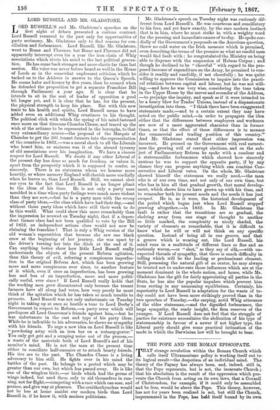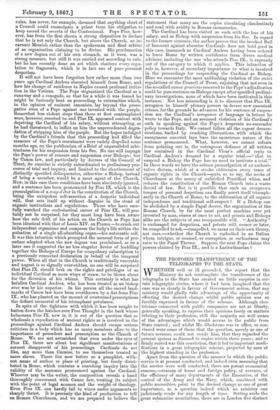THE POPE AND THE ROMAN EPISCOPATE.
T HAT strange revolution within the Roman Church which I calls itself Ultramontane policy is working itself out to, its logical result—the despotism of an individual mind. The' theory of the Papacy has always been, and, indeed, still is, that the Pope represents, but is not, the incarnate Church that his absolutism is the result of the oppression which pre- vents the Church from acting on its own laws, that a Council' of Christendom, for example, if it could only be assembled._ and be free, would be above the Pope. This theory, however, has not for years been realized in act, but still the Church,. impersonated in the Pope, has head itself bound by its own. rules, has never, for example, dreamed that anything short of a Council could emancipate a priest from his obligation to keep sacred the secrets of the Confessional. Pope Pius, how- ever, has from the first shown a strong disposition to declare that he is not only the Church, bat above the Church, an in- carnate Messiah rather than the spokesman and final arbiter of an organization claiming to be divine. His proclamation of a new dogma out of his own stomach, as it were, was a strong measure, but still it was carried out according to rule, but he has recently done an act which shatters every regu- lation to fragments, which is in fact one of pure personal despotism.
It will not have been forgotten how rather more than two years ago Cardinal Andrea absented himself from Thome, and how his change of residence to Naples caused profound irrita- tion in the Vatican. The Pope stigmatized the Cardinal as a runaway and a renegade, so that for a while it was feared he might be furiously bent on proceeding to extremities which, in the opinion of eminent canonists, lay beyond the prero- gative even of a Pope against one invested with the purple. Somewhat less violent steps than those at first contemplated were, however, resorted to, and Pius IX. appeared content with depriving the Cardinal of his salary, without attempting, as he had threatened, to inflict on him the unprecedented degra- dation of stripping him of the purple. Bat the hopes indulged by the Cardinal's friends that this proceeding had filled the measure of the Pope's resentment were rudely dispelled some months ago, on the publication of a Brief of unparalleled arbi- trariness for his suspension from his See. No one will impugn the Pope's power of censure and suspension over Bishops; but by Canon law, and particularly by decrees of the Council of Tient, its exercise is strictly subordinated to preliminary pro- cesses of trial and inquiry, and limited to the chastisement of distinctly s'pecified delinquencies, otherwise a Bishop, instead of being a member, would be a mere agent of the Church. Now, in this case these conditions have been absolutely ignored, and a sentence has been pronounced by Pius IX. which is the promulgation of a coup cr elat in the constitution of the Church, being the outspoken self-assertion of a despotic individual will, that sets itself up without disguise in the stead of organic institutions and regulations. Those who have care- fully Watched the ecclesiastical career of Pius IX., will pro- b'ably not be surprised, for they must long have been aware how the sole drift of his action on the Church as Pope has been identical with that of Louis XIV. on France —to crush out independent 'organisms and compress the body's life within the pulsation of a single all-absorbing organ—his autocratic self. It was this intention which prompted the unusual form of pro- cedure adopted when the new dogma was proclaimed, as on a later one it suggested the no less singular device of huddling together the Bishops of Europe for compulsory subscription to a Previously concocted declaration in behalf of the temporal power. When all that in the Church is traditionally venerable and august is so signally over-ridden, no one will be surprised that Pius IX. should look on the rights and privileges of an individual Cardinal as mere wisps of straw, to be blown about fOr the diversion of his whims. This certainly is what has befallen Cardinal Andrea, who has been treated as no bishop ever was by his superior. In his person all the sacred land- marks of Canon law have been overthrown by a fiat from Pius IX., who has planted on the mound of overturned prescriptions the defiant memorial of his triumphant petulance.
In spite of the tightness with which it has been sought to batten down the hatches over Free Thought in the bark whose helmsman Pius IX. now is, it is out of the question that so wholesale a repudiation of ancient rights as is involved in the proceedings againat Cardinal Andrea should escape serious criticism in a body which has so many members alive to the importance of precedent and prescription as the Church of Rome. We are not astonished that even under the eyes of Pius IX. there are silent but significant manifestations of earnest disapprovh1 of his proceedings. Cardinals do not like, any more than Curates, to see themselves treated as mere slaves. There lies now before us a pamphlet, with- out name of author or place of printing, but freely distri- buted in Rome, which contains a searching inquiry into the validity of the sentence pronounced against the Cardinal. Whoever may be the writer, the composition reveals a hand thoroughly conversant with Canon law, treating its subject with the point of legal acumen and the weight of theology. Even Pius IX. can hardly fail to wince under arguments so sharply thrust. It is precisely the kind of production to tell on Roman Churchmen, and we are prepared to believe the statement that many are the copies circulating clandestinely and read with avidity in Roman monasteries.
The Cardinal has been visited as such with the loss of his salary, and as Bishop with suspension from his See. In regard to the former sentence, the author proves that the invoked Bull of Innocent against absentee Cardinals does not hold good in this case, inasmuch as Cardinal Andrea having been ordered to leave Rome by written certificates from divers medical advisers, including the one who attends Pius IX., is expressly out of the category to which it applies. This infraction of rule is, however, of secondary importance to what is involved in the proceedings for suspending the Cardinal as Bishop. Here we encounter the most unblushing violation of the strict regulations of the Council of Trent, enjoining that not even in the so-called causce graviores reserved to the Pope's adjudication could he pass sentence on Bishops except after specified prelimi- nary investigations, none of which have been instituted in this instance. Not less astounding is it to discover that Pius IX. arrogates to himself plenary powers to decree new canonical crimes, for the grounds he advances for his sentence of suspen- sion are the Cardinal's arrogance of language in letters he wrote to the Pope, and an assumed violation of his Cardinal's oath in speaking against the Pope's desperate no-surrender policy towards Italy. We cannot follow all the cogent demon- strations, backed by crushing illustrations, with which the anonymous canonist lays bare the monstrous nature of the sentence pronounced. What, however, we cannot refrain from pointing out is, the outrageous defiance of all written law contained in the Cardinal Vicar's official reply to Cardinal Andrea's demand for a regular trial,—" that to suspend a Bishop the Pope has no need to institute a trial." In these words we have the solemn promulgation of an authori- tative dictum, which at a stroke obliterates every trace of organic rights in the Church—puts, so to say, the necks of Churchmen at the mercy of unbridled Pontifical whim, and reduces the constitution of the Roman Church into a waste devoid of law. But is it possible that such an overgrown temper of personal despotism can finally assert itself triumph- antly in the Church of Rome, to the obliteration of all organic independence and traditional self-respect ? If a Bishop can be abolished by a simple Papal decree, the organization of the Roman Church, by far the most perfect machine ever yet invented by man, ceases at once to act, and priests and Bishops alike are the subjects of one irresponsible will. "Authority" is exchanged for despotism, and priests will, sooner or later, be compelled to ask,--compelled, we mean on their own theory, not ours,—whether the Church is embodied in an Italian whom intrigue, or counsel, or corruption, or enthusiasm may raise to the Papal Throne. Suppose the next Pope claims the powers claimed by Pius IX., and is a Latitudinarian ?































 Previous page
Previous page